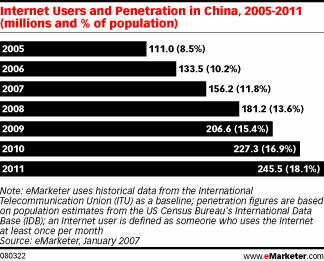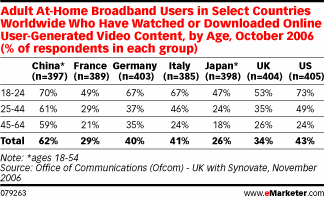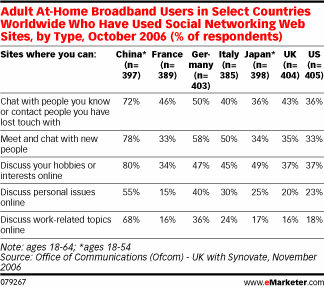By 2011, the number of Internet users in China is expected to grow to 246 million, up from 134 million in 2006, according to eMarketer estimates. This represents an average annual growth rate of 13% for the five-year period.

Not only are people in China flocking to the Internet in growing numbers, but they are also taking advantage of the Web's collaborative potential.
A November 2006 study by the UK Office of Communications (OfCom) with Synovate showed that Chinese adult at-home broadband users consume user-generated content in appreciably greater percentages than users in the US, Japan and Western Europe. In total, 62% of respondents in China said they had watched or downloaded online user-generated video content in October 2006, compared with 43% in the US (the second-ranked country in the survey) and 26% in Japan (the last-ranked).

The gap between Chinese users and those in other countries was especially pronounced among the oldest demographic surveyed — which in China and Japan was the 45-to-54-year-old bracket, while in other countries the sample reached age 64.
This discrepancy notwithstanding, what is remarkable is that a full 59% of Chinese adults ages 45 to 54 watched or downloaded user-created video clips last October. By contrast, only 18% of Japanese respondents in that age group engaged in the same activity during that period.
So what is behind this phenomenon?
Chinese Web 2.0 entrepreneur Eric Feng, founder of Beijing-based streaming video startup Mojiti, attributes it to "pent-up energy. [People] want to express themselves, but they have so few outlets to do it," he told BusinessWeek.
Other aspects of OfCom/Synovate's research support this view. Chinese broadband users were more likely than respondents in other surveyed countries to engage in a broad range of social networking activities, including meeting and chatting with people online and discussing hobbies, personal issues and work-related matters.

On the flip side, the potential pitfalls of investing in Chinese Web 2.0 startups should not be overlooked. The specter of government censorship remains a major barrier for small companies that are forced to invest staff resources to policing their own content, lest they risk being shut down by government authorities. And larger US firms such as Yahoo!, Amazon, Google and eBay have also hit roadblocks in their efforts to extend their empires in the most populous country on earth.
But the tide may be turning, and the prospect of capitalizing on the business potential of the Chinese market in the Web 2.0 era seems more and more tantalizing.





